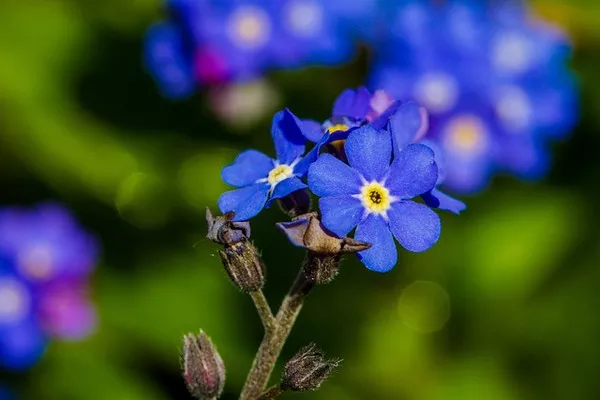Flowers have long been associated with conveying emotions, sentiments, and messages in various cultures throughout history. The colors of flowers play a significant role in this symbolism, with each color carrying its own unique meaning. Among the diverse palette of floral hues, blue flowers hold a special place, evoking a sense of calm, serenity, and mystery. In this article, we will delve into the intriguing world of blue flowers, exploring their symbolism, cultural significance, and the messages they convey.
The Significance of Blue
Blue is a color that captivates the human imagination. It is often associated with the boundless sky and the endless sea, representing vastness and freedom. Blue is also linked to tranquility and peace, making it a popular choice for interior decor, fashion, and, of course, floral arrangements. When it comes to flowers, the color blue carries its own set of meanings and conveys emotions that are as diverse as the shades of blue themselves.
Symbolism of Blue Flowers
1. Tranquility and Serenity
One of the primary symbolic meanings associated with blue flowers is tranquility and serenity. The calming effect of the color blue is mirrored in the message conveyed by blue blooms. Blue flowers are often given to offer comfort and solace to someone experiencing stress, grief, or hardship. They serve as a gentle reminder to slow down, breathe, and find peace in the midst of life’s chaos.
2. Trust and Loyalty
Blue flowers are also a symbol of trust, loyalty, and faith. The unwavering blue of the sky and sea has inspired this association. Blue flowers can be a powerful expression of commitment and trust in relationships. Giving blue blooms can signify the trust and loyalty one feels towards a friend, partner, or loved one.
3. Harmony and Unity
The color blue is often associated with harmony and unity. In the world of flowers, blue can symbolize the coming together of two individuals or groups in a peaceful and harmonious manner. It can be used to celebrate a union or to wish for a harmonious coexistence in a specific context, such as a wedding or a diplomatic agreement.
4. Spiritual and Ethereal
Blue flowers often possess a spiritual and ethereal quality. The color blue is frequently linked to the divine, and blue blooms can represent a connection to the spiritual realm. They are often used in religious ceremonies and rituals to signify devotion, purity, and transcendence.
5. Mystery and Intrigue
The color blue has an aura of mystery and intrigue, which is reflected in the symbolism of blue flowers. These blooms can be associated with the unknown, the unexplored, and the enigmatic. They are often used to express a sense of curiosity, wonder, or a desire for discovery.
Cultural Significance of Blue Flowers
The significance of blue flowers varies across cultures and traditions. Let’s explore how different societies have interpreted the meaning of blue blooms throughout history.
1. Western Culture
In Western culture, blue flowers are often linked to the Virgin Mary, who is associated with purity, virtue, and motherhood. Blue flowers, such as bluebells and forget-me-nots, are commonly used to pay homage to her and to symbolize her qualities. Additionally, in the language of flowers, or floriography, popular during the Victorian era, blue flowers were often used to convey feelings of love and devotion.
2. Eastern Culture
In many Asian cultures, particularly in China and Japan, blue is associated with immortality and transcendent beauty. Blue flowers like the blue lotus in Buddhism represent spiritual enlightenment and the journey towards nirvana. These flowers are highly regarded and are often used in religious ceremonies.
3. Native American Culture
Among Native American tribes, blue flowers are associated with various symbolic meanings. For instance, the blue cornflower has been used to represent love and affection, while the blue columbine is seen as a symbol of inner strength and resilience.
4. Mediterranean and Middle Eastern Cultures
In Mediterranean and Middle Eastern cultures, blue flowers are often associated with healing and protection. The blue iris, known for its striking blue color, is seen as a symbol of hope and protection against evil.
Common Blue Flowers and Their Meanings
Blue flowers come in various shades, and each shade conveys its own distinct message. Here are some common blue flowers and their associated meanings:
Blue Hydrangea: Blue hydrangeas are often associated with gratitude and heartfelt emotions. They can express appreciation and understanding, making them a popular choice for expressing gratitude and apology.
Blue Roses: Blue roses, though not naturally occurring, are a symbol of mystery and the unattainable. They are often used to express the sentiment of mystery or the feeling of the impossible.
Blue Orchid: Blue orchids represent rarity, luxury, and elegance. They are often given as a sign of deep respect and admiration.
Blue Delphinium: Blue delphiniums are associated with an open heart and an ardent feeling of goodwill towards others. They can be used to express an open heart and a sense of lightheartedness.
Blue Violet: Blue violets represent love and faithfulness, making them a popular choice for romantic gestures and expressions of devotion.
Conclusion
The language of flowers has allowed people to communicate their emotions and sentiments for centuries, and blue flowers hold a special place in this symbolic lexicon. With their ability to convey tranquility, trust, and mystery, blue flowers add depth and nuance to the messages we wish to express. Whether used in Western, Eastern, Native American, or other cultures, blue flowers have a rich and diverse cultural significance. As you explore the world of blue blooms, you’ll find that their beauty is not only captivating but also filled with meaningful messages that can be shared with loved ones in a bouquet of serenity and grace.


